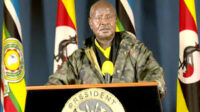Charl Kleinhaus, a 46-year-old white South African farmer, recently left behind his life in Mpumalanga, South Africa, for a budget hotel in Buffalo, New York. Once surrounded by wildlife and deep canyons in a region known as “the place where the sun rises,” Kleinhaus now calls a modest motel room home after arriving in the U.S. under a controversial executive order signed by former President Donald Trump. The policy granted refugee status to select Afrikaners, citing persecution and threats against white farmers in South Africa a claim the South African government denies.
Kleinhaus, who says he received death threats via WhatsApp and faced constant harassment, insists that his move is not an attempt to exploit the U.S. immigration system. “I didn’t come here for fun,” he said, visibly emotional as he described leaving behind his five-bedroom home, his dogs, his car, and even his elderly mother. “My children are safe now. That’s what matters most.”
He is one of 59 white South Africans whose refugee applications were fast-tracked and who recently arrived in the U.S., welcomed at Dulles International Airport with American flags and red, white, and blue balloons. Despite his gratitude, Kleinhaus is aware of the political storm surrounding his relocation. Trump and South Africa-born billionaire Elon Musk have both made statements about a so-called “genocide” against white farmers in South Africa, though such claims have been widely debunked by international and South African courts and human rights watchdogs.
Critics of the policy, including South African President Cyril Ramaphosa, have slammed the group for what they call fear-mongering and cowardice. Ramaphosa argues that white farmers like Kleinhaus are fleeing instead of working toward reconciling the legacies of apartheid, under which a small white minority, including the Afrikaner population, maintained racially discriminatory policies until 1994. Despite the end of apartheid, land ownership remains a divisive issue. More than 30 years later, the vast majority of South Africa’s productive farmland remains in white hands, prompting the government to pass a law in January allowing land to be seized without compensation in specific, equitable circumstances.
Kleinhaus claims that a government claim had already been placed on his land, making it nearly impossible to operate his farm. “Your land becomes worthless. The land expropriation has gone too far,” he stated. While acknowledging the historical suffering of Black South Africans, he is adamant: “I had nothing to do with apartheid. Nothing, nothing, nothing.”
Some of his fellow Afrikaners have criticized him and others who have accepted the U.S. refugee offer, calling them opportunists. Kleinhaus admits that while the farmer murder rate is relatively low in South Africa, the fear and threats he personally experienced were real. He recounts receiving WhatsApp messages such as, “We are coming for you, you better be awake,” and reports of his farm equipment being damaged incidents he says local police ignored.
His arrival in the U.S. comes at a politically sensitive time, as the Trump administration has simultaneously restricted other refugee admissions, including the recent revocation of Temporary Protected Status for thousands of Afghans. This stark contrast has drawn criticism from human rights groups and immigration advocates, who question why white South Africans were prioritized over others facing life-threatening situations.
The process used to vet the Afrikaner refugees has also come under scrutiny. The United Nations’ refugee agency clarified that it was not involved in the screening process a departure from standard refugee resettlement procedures. Moreover, Mr. Kleinhaus has faced backlash over antisemitic posts on his social media accounts. He claims the posts were shared during a moment of emotional distress and while under the influence of morphine for medical treatment. “It wasn’t right,” he says, “but I copied someone else’s words and regret it now.” The U.S. Department of Homeland Security (DHS) maintains that all refugee applications are thoroughly vetted and that any misconduct is investigated, though it has not commented on specific cases.
Despite the criticism and uncertainties, Kleinhaus says he does not fear potential political reversals should a new U.S. administration seek to undo the refugee offer. “Yes, it is scary,” he admits, “but I believe this is God’s plan for me.” He is determined to start over, contribute to his new country, and ensure a safer future for his children. “People must not think we are just taking advantage of this,” he says. “We came here to build a better life and be part of something meaningful.”














Leave a comment